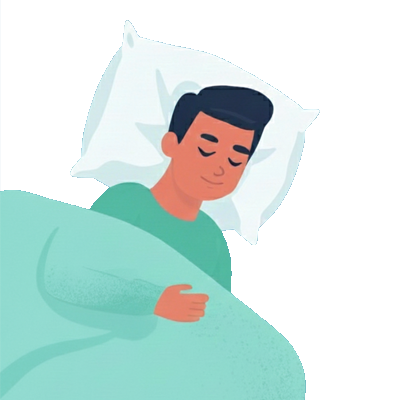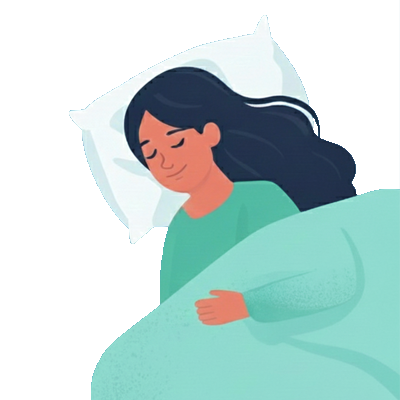Sleep apnea and obesity are two health conditions that often go hand in hand, and not by coincidence. They feed off each other in a loop that can be hard to break. Understanding this connection is necessary not only for managing each condition but also for preventing long-term health consequences such as cardiovascular disease, diabetes, and chronic fatigue.
Key Takeaways:
- Sleep apnea can cause weight gain by disrupting hormones, sleep patterns, and energy levels.
- Obesity increases the risk of sleep apnea by physically narrowing airways and reducing lung capacity.
- Sleep apnea and weight gain fuel each other through hormonal, behavioral, and metabolic effects.
- Yes, obesity can directly lead to sleep apnea, especially when excess fat accumulates around the neck and abdomen.
- Treatment and lifestyle changes can help break the cycle and improve both conditions.
Can Sleep Apnea Cause Weight Gain?
Yes, and the reason is rooted in the fact that sleep apnea disturbs the normal hormonal and metabolic functions.
When you have obstructive sleep apnea (OSA), your airway becomes blocked during sleep, causing frequent pauses in breathing. These interruptions reduce oxygen levels and fragment your sleep, even if you don’t fully wake up. As a result, your body becomes stressed.
This stress triggers an increase in cortisol, a hormone associated with fat retention, especially around the belly. Additionally, sleep apnea disrupts your hunger hormones, lowering leptin (which signals satiety) and increasing ghrelin (which stimulates hunger). That means you’re more likely to feel hungry throughout the day and crave high-calorie foods.
Moreover, inadequate sleep from apnea also leads to daytime fatigue, making it harder to stay active. Over time, the combination of increased appetite, poor metabolism, and low energy levels can lead to weight gain.
Obesity and Sleep Apnea: A Two-Way Street
Obesity is one of the biggest risk factors for developing sleep apnea. Around 70% of people with OSA are obese, according to Science Direct. But this link goes beyond just numbers; it’s anatomical and physiological.
Excess fat around the neck and upper airway can narrow the airway passage, making it more likely to collapse during sleep. Additionally, fat deposits in the tongue and soft tissues of the throat increase the chances of obstruction. Moreover, abdominal obesity also plays a role; it reduces lung volume and makes breathing harder when lying down.
Furthermore, this physical strain on the respiratory system makes it easier for sleep apnea to develop or worsen. Once it begins, the condition often triggers the same hormonal and metabolic issues that lead to further weight gain, continuing the cycle.
Thus, the connection between obesity and sleep apnea is not just coincidental; it’s a direct and mutual relationship.
Sleep Apnea and Weight Gain: A Hidden Metabolic Hurdle
A few days of sleepless nights due to sleep apnea may not result in weight gain. However, there is a deep connection between sleep apnea and weight gain at the metabolic level, and eventually, you will experience visible results in the form of weight gain.
Sleep apnea disrupts the body’s natural sleep architecture, especially deep sleep and REM cycles. Thus, there are many hidden dangers of untreated sleep apnea. This disruption negatively affects insulin sensitivity, making it harder for your body to process sugar efficiently. Over time, this can lead to insulin resistance, a precursor to type 2 diabetes, and a known contributor to weight gain.
Moreover, the chronic sleep disruption also slows down your resting metabolic rate (RMR). Your body burns fewer calories at rest, even when you’re not eating more. Combined with lower energy levels and more cravings, this slow metabolism fuels a steady increase in body weight.
Can Obesity Cause Sleep Apnea?
Yes, and it’s often the first step in the cycle.
Excess body weight, particularly around the neck and midsection increases physical pressure on the airways. This pressure makes it harder to breathe freely during sleep. Moreover, as fat accumulates, the muscles surrounding the throat may weaken or collapse more easily. It leads to obstructions during sleep, the visible signs of obstructive sleep apnea.
Additionally, obesity affects the respiratory system in multiple ways:
- It reduces lung volume, especially when lying flat.
- It increases inflammation in the airways.
- It contributes to lower oxygen levels and higher carbon dioxide retention.
This mechanical and systemic strain lays the ground for sleep apnea to take hold. So, if you’re wondering, “can obesity cause sleep apnea?”, the answer is yes, and very often does.
Looking for a Comfortable Way to Manage Sleep Apnea?
Discover custom oral appliances designed to treat sleep apnea comfortably and effectively.




Breaking the Cycle: What Can You Do?
While the connection between sleep apnea and obesity may seem like a vicious cycle with no escape, the good news is that addressing one can often help with the other.
Here are some practical steps:
Get Diagnosed Early
If you snore loudly, wake up gasping, or feel tired even after a full night’s sleep, talk to your doctor about getting a sleep study. Diagnosis is the first step toward treatment.
Try Oral Appliance Therapy
For many people with mild to moderate sleep apnea, an oral appliance can be an effective treatment option for sleep apnea. These devices are worn like a mouthguard and work by keeping the airway open while you sleep. Better sleep can help restore your energy, improve metabolism, and support weight loss efforts.
Focus on Sustainable Weight Loss
Even modest weight loss, 10-15% of your body weight, can greatly reduce the severity of sleep apnea. Combine a balanced diet with regular, low-impact exercise like walking or swimming to get started. Improved sleep will enhance your ability to stay active and make healthier food choices.
Monitor Sleep and Lifestyle Habits
Keep a sleep journal or use a wearable device to track your sleep patterns. Also, reduce alcohol intake and avoid sedatives, as these can worsen apnea symptoms.
Consider Multi-Disciplinary Care
Working with a team that includes a sleep specialist, nutritionist, and primary care doctor can give you a comprehensive strategy for managing both conditions.
Final Thoughts
To sum up, the relationship between sleep apnea and obesity isn’t just one of cause and effect; it’s a continuous feedback loop that requires proper intervention. Left unchecked, this cycle can lead to multiple serious health issues, including heart disease, stroke, diabetes type II, and even depression.
The encouraging news is that you have the power to break the cycle. Whether you start by treating sleep apnea or losing a few pounds, every step forward can have a ripple effect. Better sleep leads to better energy, which supports better choices, and over time, better health.
Have Questions About Disturbed Sleep?
Don’t wait for the symptoms to get worse. Talk to your doctor, get tested, and take the steps toward better sleep and a healthier life.










